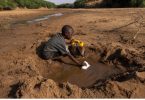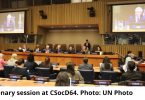At the beginning of their 2022 annual meetings, on Monday October 10th, David Malpass, the president of the World Bank Group, and Kristalina Georgieva, the managing director of the International Monetary Fund, warned of an increased risk of a global recession and noted that inflation was still an ongoing issue in the wake of Russia’s invasion of Ukraine.
Many issues at once
The world is currently coping with the problems of the epidemic, the conflict in Ukraine, and a worldwide food and energy crisis. All these make the Annual Meetings of the World Bank and IMF of 2022 a pivotal occasion. The most vulnerable are suffering as a result of these escalating
problems, which are endangering their livelihoods. Decision-makers, international organizations, and the corporate sector must move swiftly and in concert to develop resilience in this volatile time. The meetings that began on Monday in Washington DC, are the first face-to-face discussions between the two organisations since the COVID-19 epidemic began with Malpass telling Georgieva, “There’s a chance and actual danger of a world recession next year.”

He emphasised persistent inflation worries, sluggish growth in wealthy economies, and currency devaluation in many emerging nations. The head of the IMF announced last week that the organization would lower its projection for 2.9% global growth in 2023 when it releases its World Economic Outlook on Tuesday. The shocks brought on by the COVID-19 pandemic, Russia’s invasion of Ukraine, and climate disasters on all continents were cited as reasons for the change. She pointed out that all three of the world’s major economies are experiencing a slowdown in economic activity: China, where COVID-19 disruptions and housing volatility are hindering growth, and the United States, where interest rate hikes “are starting to bite.” Europe has been particularly hard hit by high natural gas prices. Both Managers emphasized the need for coordinated action to support emerging markets, saying that factors including slowing growth in rich nations, rising interest rates, climate threats, and persistently high food and energy costs are particularly detrimental to poor countries. Since a debt crisis would affect all nations, not just those with large debt loads, advanced economies needed to “get the great, terrible risk of debt crisis under control,” according to Georgieva, the first IMF chief from an emerging market economy. “Not the best of images. But if we banded together and took action as a group, we could lessen the suffering we’ll experience.”

Georgieva stated that despite the detrimental effects on the economy, the IMF would continue to urge central banks to keep up their efforts to control inflation this week. We are in trouble if they don’t do enough, she said, adding that “we cannot afford for inflation to be a runaway train.” To ensure that they did not add more “fuel to the fires of inflation,” fiscal measures should be “carefully targeted.”
More financial troubles
Georgieva mentioned that the IMF estimated that this year, one-third of the global economy will have seen at least two quarters of negative growth, with the slowdown costing the economy $4 billion between now and 2026. All three of the world’s major economies are slowing down, she added. “Eurozone, especially due to the sharp increase in petrol costs. We observe a major issue in China that is slowing down growth due to COVID interruptions and the unpredictability of the property market, Georgieva added. “And in the United States, the job market is still quite robust, but it is also losing some impetus as interest rates begin to rise.” The Federal Reserve has been gradually raising interest rates throughout this year to reduce record inflation, which has sparked worries that the United States may be headed for a recession. Malpass and Georgieva’s comments coincide with this trend. The precedents don’t make for good reading, all the indicators point to a difficult time for the world. It is however a positive thing that governing bodies are aware and active in looking for the best solutions. This way the troubling waters ahead can be calmed.








